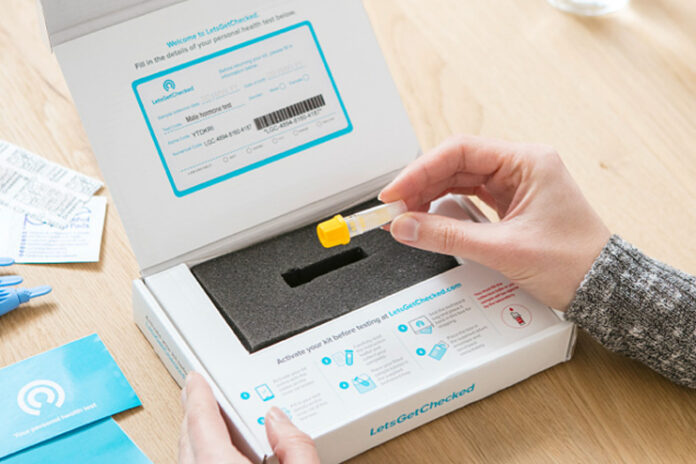Affiliate Disclaimer
Some links in this article are affiliate links. We may earn a small commission if you make a purchase through these links, at no extra cost to you. We only recommend products we find useful to our readersIt’s critical to monitor our health in today’s fast-paced world. Vitamin deficiency tests that can be done at home provide a proactive means of preserving our health. However, it’s important to note that these tests have their limitations and should not replace professional medical advice. By offering a quick and easy way to determine vitamin deficiencies, these tests empower people to take charge of their health from the comforts of their own homes.
This article will examine the role of at-home vitamin deficiency tests in tracking general health and wellness while stressing the practicality and value of these tests in preventative healthcare.
Understanding Vitamin Deficiencies

Vitamins, as essential micronutrients, play a crucial role in various body processes, including energy metabolism and immune system support. When these vitamins are deficient, it can have severe implications for our health. Common deficiencies, such as those in iron, vitamin B12, and vitamin D, can lead to symptoms like weakness, exhaustion, and increased susceptibility to infections. Prolonged deficiency can even result in more severe health conditions, such as neurological diseases, osteoporosis, and anemia.
Maintaining sufficient vitamin levels is essential for achieving physical and mental health. Adequate vitamin intake promotes healthy growth and development, strengthens immunity, and prevents chronic illnesses. Awareness of warning signs and symptoms of vitamin deficiencies enables people to take preventative action to correct imbalances and preserve general health and vigor. However, it’s important to understand that the context of these results, such as your overall health, lifestyle, and diet, also plays a significant role in their interpretation.
Also, read: Vitamin D Deficiency – Causes, Symptoms, Diseases And Treatment
Benefits of At-Home Testing Kits
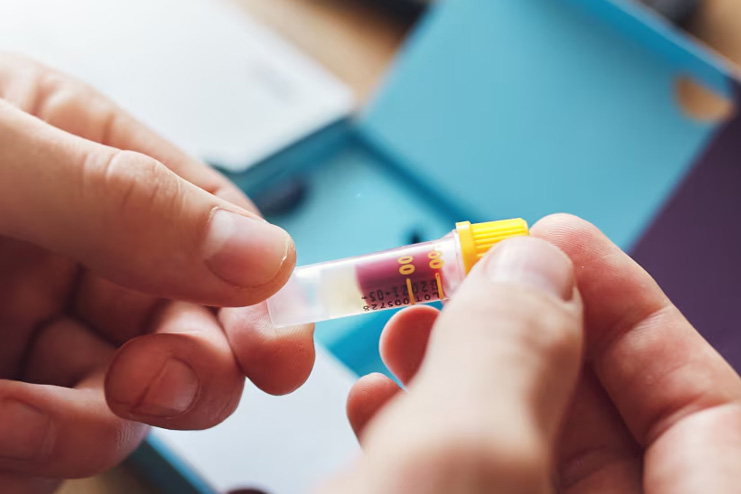
At-home vitamin deficiency testing provides numerous benefits to transform how people track their health. However, it’s important to be aware of potential risks and side effects, such as minor discomfort during the testing process or the possibility of misinterpreting results without professional guidance.
One of the most significant advantages of these packages is the unparalleled convenience they offer. Without the need to schedule appointments or visit a medical facility, individuals can obtain crucial information about their vitamin levels with just a quick prick of the finger or a saliva sample. This convenience factor is a game-changer in health monitoring.
Another advantage is privacy. With at-home testing, people may evaluate their vitamin status in the privacy and comfort of their homes, eliminating any potential awkwardness when discussing private health issues with medical professionals.
Furthermore, at-home testing kits are sometimes more reasonably priced than conventional lab tests, which increases their accessibility for a larger group of people. Because of its affordability, health monitoring becomes more accessible to everyone, enabling them to take proactive measures to improve their health. The value of at-home testing also lies in its convenience, privacy, and the empowerment it provides to individuals to manage their health.
Most importantly, these kits empower individuals to take control of their health. At-home testing kits provide valuable information about vitamin levels, enabling the individuals to make informed decisions about dietary modifications and supplementation based on their unique needs. This sense of empowerment is a key aspect of proactive health management.
People are empowered to optimize their well-being and lead healthier, more fulfilling lives with this proactive approach to health management. However, it’s important to remember that self-diagnosis based on at-home testing results can be risky. It’s always best to consult with a healthcare professional for a comprehensive assessment of your health.
Also, read: 8 Most Effective Prenatal Vitamins for Hair Growth
Key Features to Consider
Several essential elements should be considered when selecting an at-home vitamin deficiency test to ensure reliable findings and a satisfying testing experience.
To start, precision is crucial. Seek testing kits that are highly accurate in identifying vitamin deficiencies and have undergone clinical study validation. This ensures that the results you receive are reliable and can be trusted.
Another important consideration is the ease of usage. Kits that provide straightforward and easy-to-use testing protocols reduce the possibility of mistakes and guarantee a seamless testing process for users with varying levels of expertise.
Panels for thorough testing are also crucial. To assess your nutritional condition thoroughly, use a kit that allows testing for a variety of vitamins, like vitamin D, vitamin B12, iron, and more. This ensures that you get a comprehensive understanding of your nutritional status.
The testing kit’s reputation is equally important. Select a recognized brand with a track record of offering precise instructions and dependable results. One way to assess a testing kit’s dependability and guarantee confidence in the results is to read customer reviews and testimonials.
Considering these important factors, you can choose an at-home vitamin deficiency test that suits your needs and gives you precise, helpful information about your nutritional status.
Also, read: 8 Side Effects of Too Much Vitamin D That Can Be Dangerous
Top 3 At-Home Vitamin Deficiency Tests

In the age of preventative health management, there has been a meteoric rise in the popularity of at-home vitamin deficiency tests. This article will examine and contrast the top five available at-home vitamin deficiency tests. We will explore the testing techniques, vitamin panels, and user reviews of each of these kits to assist you in making an educated decision regarding which kit is the most suitable for your requirements.
1. Everlywell Vitamin D & Inflammation Test Kit
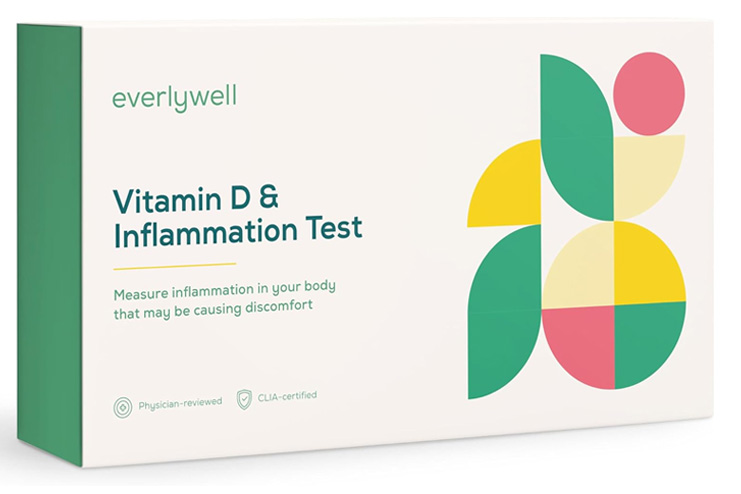
Everlywell’s Vitamin D & Inflammation Test Kit is a unique offering for individuals looking for a complete way to learn about their levels of inflammation and vitamin D. This kit simplifies testing by requiring only a tiny blood sample that users can obtain with a quick finger prick. After collecting the sample, users send it to Everlywell’s approved laboratory for in-depth analysis. Users can safely view their results through Everlywell’s online platform in a matter of days, giving them essential information about their current state of health.
Many have praised Everlywell’s kit for being very user-friendly. Users with different experience levels can utilize it because of the simple gathering method and the straightforward instructions provided. Users also value the thorough explanations in the findings report, which aid in their understanding of their vitamin D levels and inflammation markers.
Although it has many benefits, some users have reported inconsistent results. Although most users report positive experiences, some have expressed dissatisfaction with differences in the results of tests they took at home and tests they took later in a clinical environment. This highlights the potential drawbacks of at-home testing, emphasizing how crucial it is to consider various elements and speak with medical specialists to thoroughly grasp one’s current state of health.
2. AFIL | Food, Drinks & Vitamin Sensitivity Testing Kit for Adults & Kids
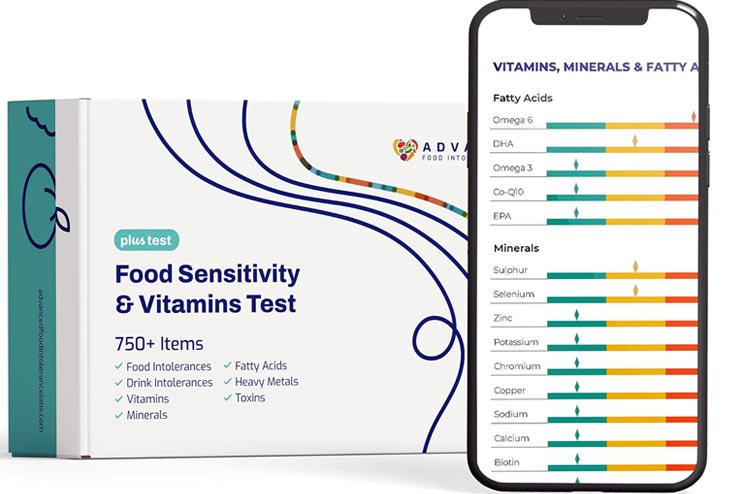
The AFIL Food, Drinks, and Vitamin Sensitivity Testing Kit tests for food sensitivities, intolerances, and vitamin deficiencies and is designed for adults and children.
Blood, needles, and appointments are not allowed. It’s just a tiny sample of hair, maybe ten strands near the root. Additionally, hair on the body or the face is accepted and welcomed.
With the AFIL Food, Drinks, and Vitamin Sensitivity Testing Kit, you can quickly determine whether you have any sensitivities to foods and beverages and any dietary deficiencies that could be affecting your energy levels. Your results will be available in just three working days, providing prompt and efficient service.
To receive and register your kit, you must develop an account online. Take sample of hair and return it using the pre-paid envelope.
Within three business days of your sample arriving at our facility, you can access the results of your tests through your portal. It uses biofeedback technology to identify your cellular patterns and responses, stimulating inflammatory reactions in your cells.
3. 5Strands Nutrition Deficiency Test
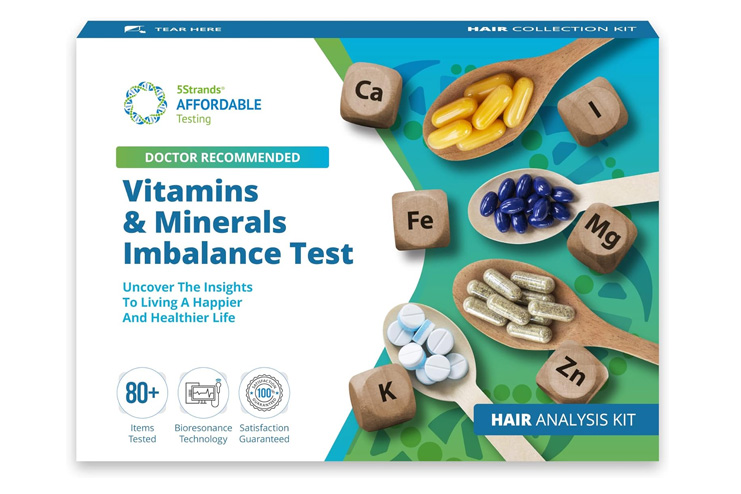
A variety of physical health problems may arise when your body cannot appropriately absorb particular nutrients from your food and supplements, according to the 5Strands Nutrition Deficiency Test. Dry skin, brittle nails, hair loss, inflammation, and muscle cramping are typical signs of nutritional imbalances. Using our hair-analysis imbalance testing solution, we can determine whether your body is deficient in specific vitamins, minerals, fatty acid, amino acid, and trace minerals. Knowing which foods you are mildly, moderately, or severely unable to absorb will help you modify your diet proactively. Once you’ve determined which vitamins and minerals your body struggles to absorb, you can modify your diet to achieve optimal absorption.
To start, give whole foods (meats, fruits, veggies, and nuts) more priority because your body can absorb these naturally occurring forms of nutrition more readily. (2) If you take supplements, prefer companies that provide nutrients in their entire food form instead of artificial additives that interfere with your body’s natural processing.
How to Interpret Results
Understanding one’s current health status and taking the necessary action requires being able to interpret the findings of at-home vitamin deficiency tests. If the results show low amounts of a particular vitamin, understanding the possible effects on general health is critical. Low amounts of vitamin B12 can cause weariness and neurological problems. In contrast, low vitamin D levels can weaken bones and make people more prone to infections.
After receiving such results, people should consider speaking with a healthcare provider to discuss the possible treatment choices. Vitamin supplements or dietary changes that include foods high in the lacking vitamins may be part of the treatment. Lifestyle modifications like reducing stress or getting more sun exposure to synthesize vitamin D may also be helpful.
People can enhance their long-term health and well-being by appropriately interpreting test results and taking proactive measures to remedy shortcomings.
Precautions and Considerations
It is essential to approach the process of using at-home vitamin deficiency testing kits with particular safeguards and considerations. Although these tests provide insightful information about a person’s health, they cannot replace expert medical guidance. Individuals should undergo additional testing and discuss any abnormal results with a healthcare provider to decide on the best course of action.
Furthermore, in addition to routine medical exams, at-home testing kits should be considered an additional tool for health monitoring. Combining the convenience of at-home testing with the knowledge and experience of healthcare professionals ensures a comprehensive strategy for preserving optimal health and well-being.
Conclusion
In summary, at-home vitamin deficiency tests offer a practical and proactive means to enhance well-being and health. These tests give people the information they need to take charge of their health and make educated decisions regarding dietary adjustments and supplements by giving them easily accessible insights into their nutritional status.
We urge readers to investigate the suggested testing kits previously discussed in this manual and take proactive measures to optimize their vitamin intake. People can start their journey towards improved general health and well-being with the help of healthcare professionals and the ease of at-home testing.
More Related Articles:
References
- https://www.verywellhealth.com/vitamin-deficiency-3014720
- https://www.mayoclinic.org/diseases-conditions/vitamin-deficiency-anemia/symptoms-causes/syc-20355025
- https://www.everydayhealth.com/hs/guide-to-essential-nutrients/common-nutrient-deficiencies/
- https://www.medicalnewstoday.com/articles/signs-of-vitamin-deficiency
- https://www.testing.com/tests/at-home-vitamin-d-test/
- https://www.forbes.com/health/medical-supplies/best-vitamin-deficiency-tests/
- https://www.consumerreports.org/cro/2012/12/test-yourself-at-home/index.htm
- https://www.medicalnewstoday.com/articles/vitamin-deficiency-test
- https://www.testing.com/vitamins-and-nutritional-testing/
- https://ada.com/micronutrients/vitamin-deficiency-test/
- https://www.rupahealth.com/post/understanding-nutritional-deficiencies-when-to-utilize-micronutrient-testing
- https://www.ncbi.nlm.nih.gov/pmc/articles/PMC8469089/
- https://www.talktomira.com/post/how-do-you-test-for-vitamin-deficiency
In this Article















